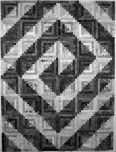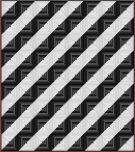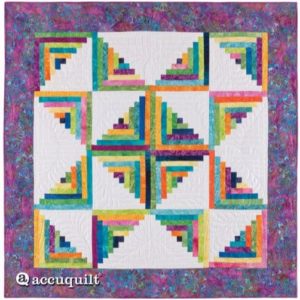Thanks for joining our Black and White challenge! Here for your perusal today is a tutorial for a black and white log cabin quilt block. One of the most traditional quilt designs there is, the log cabin block has its roots in antiquity. There is a mummy of a cat wrapped in a log cabin design in the British Museum. Not to be left out, the log cabin block can be seen in marquetry and tile designs of early Greek and Roman floors.
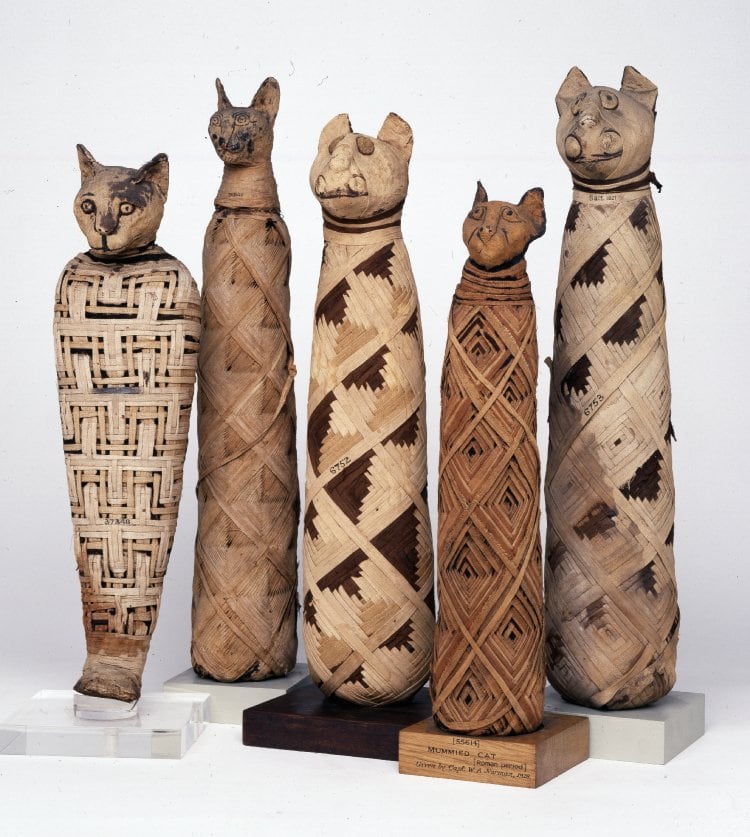
The log cabin as a quilt block pattern became popular in America in the 1860s (although the design can be traced to the UK in the mid-1700s, where it was called Roof Eaves.) In fact, it was once referred to as Lincoln’s Log cabin. My guess is that the Log Cabin block probably became a favorite among early quilters because it gave them the chance to use narrow scraps of fabric leftover from making garments.
When I first became interested in quilt history, I was told that a black centered log cabin hung on a line might indicate a safe house for a runaway slave. It wasn’t until much later that I actually started studying American history that I discovered how foolish that notion was. Now we say a red center represents the hearth of the home. That’s probably not historically accurate either:-))
This tutorial is for a traditional log cabin quilt. Well, I should say, the traditional block. There are probably hundreds of different ways to set this block and just as many names for them. I don’t consider the Pineapple block, the Courthouse Steps block, the Quarter Square block, or the Curved Log Cabin block to be traditional log cabin blocks. They are wonderful blocks on their own, but they aren’t traditional log cabin blocks. IMHO.
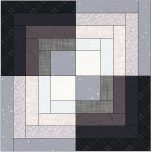
Quarter Square. Blocks that are cut in quarters and recombined. Yes, I have seen this in antique quilts, although they are usually set on point. | 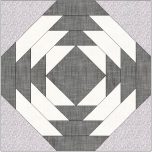 I have an antique red and black version of this, but it was pieced to a foundation and the black has deteriorated along the seams. (sigh) I have an antique red and black version of this, but it was pieced to a foundation and the black has deteriorated along the seams. (sigh) | 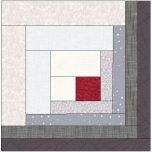
I used the Curved Log Cabin block in the Circle of Life pattern. Four of these could make a snowball. |
For me, a traditional log cabin block starts with a square in the center. These are surrounded by logs of the same width but different lengths spiraling around the center. By altering the way individual logs are colored, an astonishing variety of blocks can be created.
Now, of course, there are different ways of piecing the center, including foundation piecing and folding. Quilt historian Pepper Cory owns a log cabin quilt where the logs have actually been folded in half wrong sides together before being sewn to a foundation.
Here are the three center types that I have found in my antique quilts. Any block with a large center square can feature a fussy cut motif or another block like a half-square triangle. Lots of design opportunities there!
There are as many different ways to arrange a Log Cabin quilt as there are ways to arrange a Half Square Triangle Quilt. Here are just a few, and there are more on my Pinterest Log Cabin Quilt Board. I also have a Black and White Quilts Pinterest board as well.
How to Make a Log Cabin Quilt Block
Here are the secrets for creating perfect log cabin quilt blocks:
- You need a perfect 1/4″ seam. This is not negotiable. When you have a block that has that many seams in it, you need to be as close to perfect as you can. However, it’s always better for your block to be too big than too small. That way you can square it up when you are done sewing the block. You MUST square up the individual blocks before sewing the rows, though.
- Cut *with* the grain. Crosswise grain (selvage to selvage) gives just a little – it’s enough to distort the block unless you are using a walking foot and carefully pinning. Use the lengthwise grain parallel to the selvage.
- Use Accuquilt. Yes, I know the machine is expensive and so are the dies. However, it is a one-time investment in the accuracy of your future quilts. Take a look at their log cabin die. In one swipe, you can cut ALL the pieces for 6 log cabin blocks in 6 different sizes, all along the lengthwise grain. Can you share this die with a friend, maybe? Could you suggest to your guild that they buy it as part of a lending library? Accuquilt is very generous with their free patterns, like the one below.
Barn Raising Log Cabin Block
Here is the block you will be making. Of course, you can use your own colors and not just black and white. Each block finishes at 8″ so you can make your quilt as large or small as you like. If you would like a pattern for the 92″ x 92″ quilt shown above, click here to purchase for $10.00.
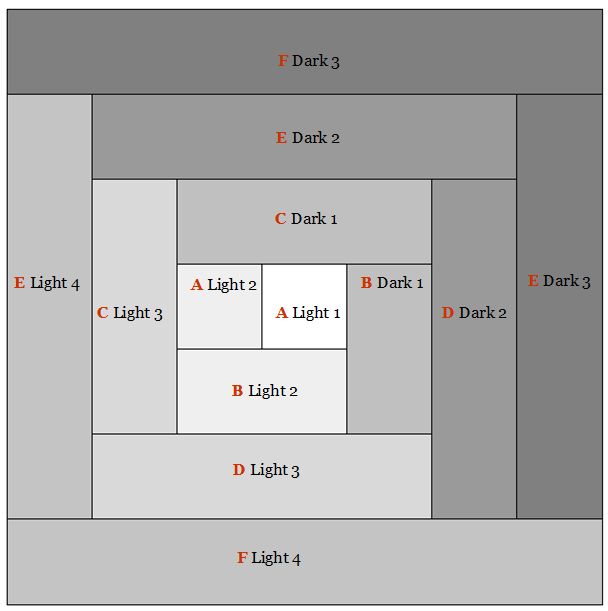
Just a note: if you are cutting these strips by hand, please consider using a strip ruler, like the Stripology or June Tailor ruler. It will make your cutting much easier. If you have an Accuquilt, you need Die # 55017
Light 1 makes the 2-1/2″ x 2-1/2″ “A” squares
Light 2 makes the 2-1/2″ x 2-1/2″ “A” squares and the 2-1/2″ x 4-1/2″ “B” rectangles
Light 3 makes the 2-1/2″ x 6-1/2″ “C” rectangles and the 2-1/2″ x 8-1/2″ “D” rectangles
Light 4 makes the 2-1/2″ x 10-1/2″ “E” rectangles and the 2-1/2″ x 14-1/2″ “F” rectangles
Dark 1 makes the 2-1/2″ x 4-1/2″ “B” rectangles and the 2-1/2″ x 6-1/2″ “C” rectangles
Dark 2 makes the 2-1/2″ x 8-1/2″ “D” rectangles and the 2-1/2″ x 10-1/2″ “E” rectangles
Dark 3 makes the 2-1/2″ x 10-1/2″ “E” rectangles and the 2-1/2″ x 14-1/2″ “F” rectangles
More of my log cabin quilts. This picture was taken at a trunk show in October 2013. The one on the left is Log Cabin Bargello. The one on the right is Circle of Life and on the table is Bobbins and Spools.
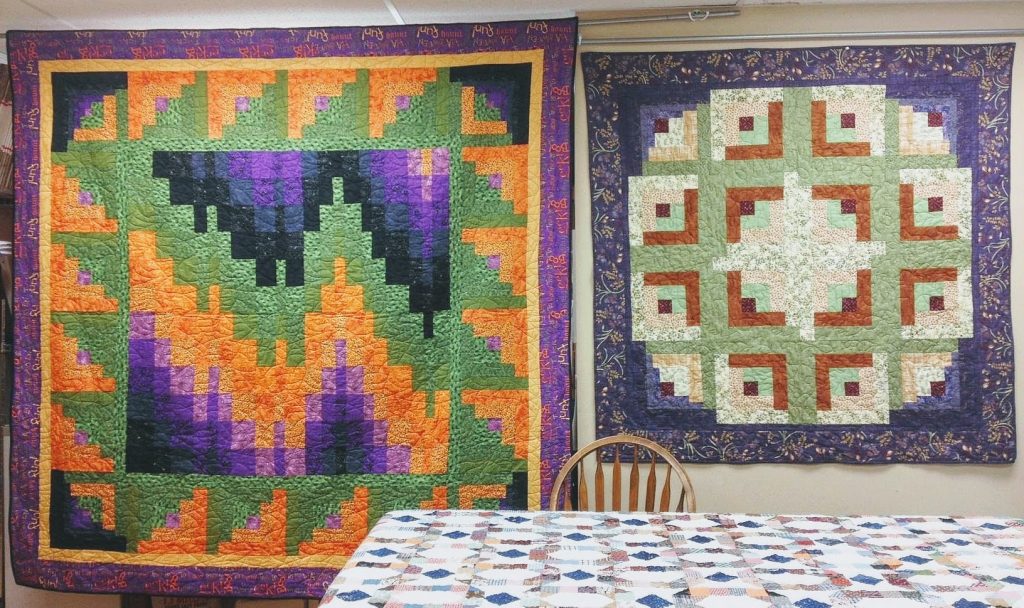
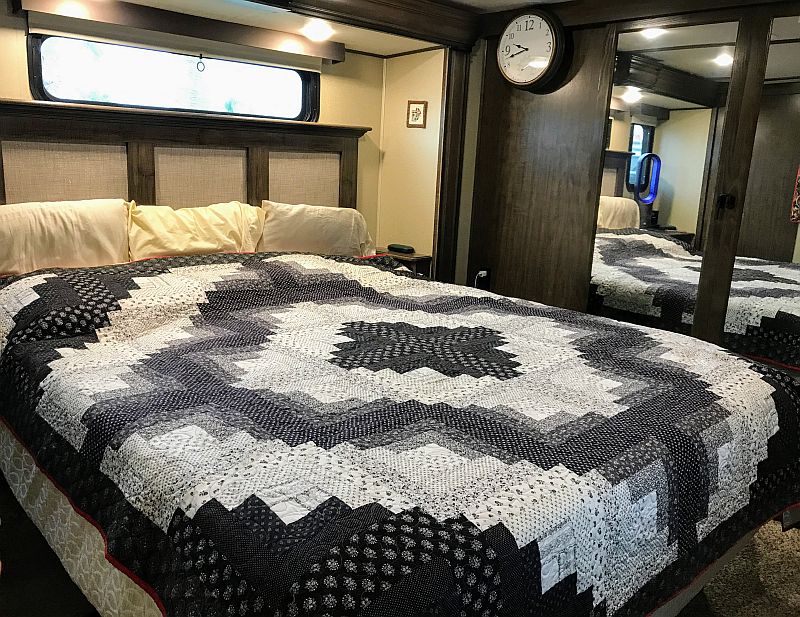
This is my black and white log cabin quilt on the bed of my travel trailer. It really brightens the room! This traditional log cabin pattern is great for scraps. Or make it dramatic, using only black and white scraps, with a red binding, of course:-)) Either way, you will find this pattern well written and illustrated. Great for a beginner’s first BIG quilt. Finishes about 92″ x 92″.
Have another tip to offer? Send it to me or reply below and I will add it here.
Don’t forget to sign up for the newsletter! Once a week, I send updates on quilt-related information I have found while wandering the web. This might be an inspiring article, a tip or tutorial I have discovered (or written), and occasionally exclusive offers & discounts as well as immediate access to the secret page of free patterns, guides, and printables. You can follow my page on Facebook, or join the Make Believe Quilters group, too.


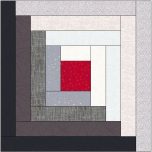
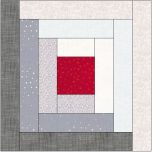
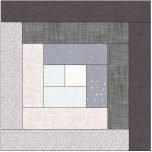
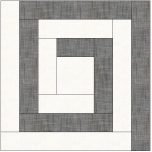
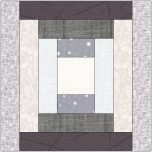
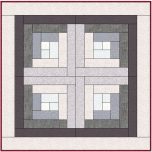
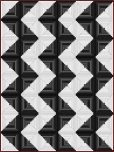
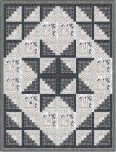
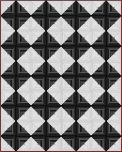 Sunshine and Shadows
Sunshine and Shadows